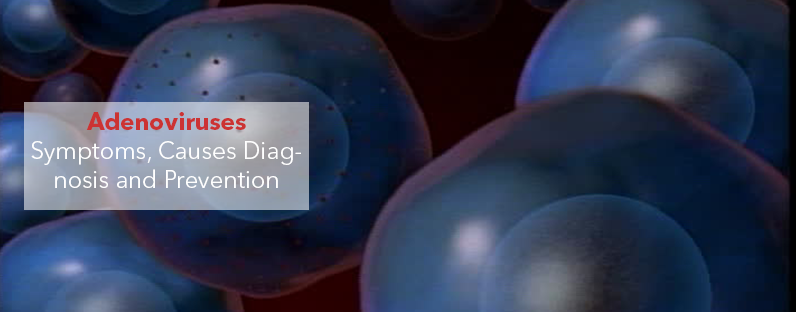Adenoviruses-Symptoms, Causes Diagnosis and Prevention
Adenoviruses are a group of common viruses that infect the eye, air and lung lining, intestines, urinary tract, and nervous system. They are common causes of fever, cough, sore throats, pink eye and diarrhoea.
Infections occur more frequently in children than in adults, but anybody can get them. Around the time they are 10, most children will get at least one form of adenovirus infection.
The infections usually only cause mild symptoms and recover in a few days on their own. But in humans with poor immune systems, particularly children, they may be more severe.
Symptoms
Adenoviruses can cause a large number of diseases, like
- Common cold or flu-like symptoms
- Fever
- Sore throat
- Acute bronchitis (inflammation of the airways of the lungs, sometimes called a “chest coldâ€)
- Pneumonia (infection of the lungs)
- Pink eye (conjunctivitis)
- Acute gastroenteritis (inflammation of the stomach or intestines causing diarrhoea, vomiting, nausea and stomach pain)
- Less common symptoms of adenovirus infection include
- Bladder inflammation or infection
- Neurologic disease (conditions that affect the brain and spinal cord)
Causes
Group of adenoviruses causes infection. These are the most common ways that the viruses spread from child to child:
Respiratory Infection: Fluid from the nose, mouth, throat, and lungs (respiratory tract) can contain the virus. Respiratory infections occur while someone else is coughing or sneezing with the virus. It can also be spread by touching an object that is contaminated by the virus. The virus can live for many hours on things such as doorknobs, counters, and toys.
Digestive Tract Infection: This form of the virus is spread by faecal-oral transmission. This is mostly because the kid wasn’t properly washing his or her hands or long enough. It can also be caused by eating or drinking contaminated food or water.
Risk factors
Infection with adenovirus can occur in an infant of any age. Kids aged 6 months to 2 years who are in childcare are more likely to become sick with these viruses. Adenovirus digestive tract infections are more common in children younger than 5 years of age. Most kids have had at least infection with one adenovirus by age 10.
Diagnosis
Your child’s doctor may want to do a physical exam and possibly one or more of those tests to see if the infection was caused by a virus or bacteria:
- Blood test: A nurse will take a sample of blood from your child’s vein in his arm.
- Urine test: Your child is pee in a cup that the nurse is giving you.
- Swab test: A nurse will use a cotton swab to take a mucus sample from your child’s nose.
- Stool test: Gather a sample of your child’s poop at home and bring it to the doctor’s office.
- Chest X-ray: Your kid can still lie while a technician uses a tiny amount of radiation to take pictures of her chests inside. This will give your child’s doctor a closer look at her heart and lungs.
Complications
Possible complications include:
Chronic Lung Disease:. A child who obtains pneumonia from adenovirus can develop chronic lung disease in very rare cases.
Severe Infection: An infant with a weak immune system is at risk of more severe adenovirus infection.
Intussusception: That is when one part of the intestine slides like a telescope over another segment. It causes blockage in the intestine. It most often occurs in babies. This is a medical emergency. The symptoms can include bloody stool, vomiting, abdominal swelling, knees flexed to chest, loud cries from pain, weakness, and lack of energy.
Prevention
To help keep your child from getting sick:
• Seek to hold your child away from someone who you think is sick.
• Wash your child’s hands — and yours — often during the day, and especially before meals. Use an alcohol-based hand sanitizer if you don’t have soap and water nearby.
• Clean surfaces, like sinks and counters, to get rid of germs.
• Don’t let her swim in pools that aren’t well maintained.
Keep your child home while sick so as not to transmit adenoviruses to others. If she sneezes or coughs, instruct her to cover her nose and mouth.
Treatment
People with adenovirus infection, there is no specific treatment. Most infections with adenovirus are mild, and can only require treatment to help alleviate symptoms such as over-the-counter pain medications or fever reduction. Always read the label, and use drugs as directed. No antiviral medicines are approved for adenovirus infections.


